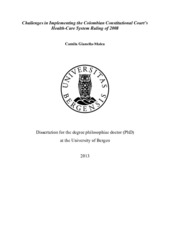Challenges in Implementing the Colombian Constitutional Court’s Health-Care System Ruling of 2008
Doctoral thesis

Åpne
Permanent lenke
https://hdl.handle.net/1956/15703Utgivelsesdato
2013-08-28Metadata
Vis full innførselSamlinger
Sammendrag
Is right-to-health litigation a suitable strategy for advancing the right to health, or does it reinforce inequalities and undermine health authorities in their attempts to control costs and set fair priorities? The answer depends, amongst other, on the nature of the judgments and how they are implemented. The latter is the main focus of this thesis. The thesis presents an approach for evaluating the implementation of often complex judicial rulings calling for health system reform. Despite major developments providing conceptual clarity on the legal enforcement of economic social and cultural rights (ESCR), research analyzing the implementation processes of these rulings and their actual impact is scarce. Anecdotal evidence points to different conclusions. In some cases, legal enforcement of the right to health has been used to enhance the rights of vulnerable groups who face systematic and structural discrimination in national policies. In others, legal enforcement has been used as a strategy to claim the rights of individuals and groups who are not among society’s most vulnerable (Ferraz, 2009). This thesis aims to contribute to the development of a systematic understanding of the elements that affect the implementation of judicial rulings and how this shapes the effects of the litigation. It is based on an analysis of the implementation process of the Colombian Constitutional Court’s decision T-760/2008, which ordered extensive reforms of Colombia’s health system (Yamin, Parra-Vera, & Gianella-Malca, 2011). Colombia has the highest number of right-to-health cases in the world per capita, and the intervention of the country’s Constitutional Court has not been beyond criticism. Taking the effects of right-to-health litigation as my departure point, I focus my analysis on the implementation process of some of the orders of decision T-760/2008, as well as on the contextual factors that influenced how these orders were satisfied by the competent authorities. The three articles of this thesis address different elements of decision T-760/2008: (i) participatory processes in the implementation of the decision; (ii) the decision’s impact on children’s access to health care; and (iii) the fairness and legitimacy of the drugs priority setting in health care. The results from the three articles are examined using an analytical framework for ESCR mobilization developed by a group of scholars linked to the “Right to Health Through Litigation” project of which this thesis forms part (Global Center for the Study of Law and Social Transformation, 2011). Together, the articles illustrate the importance of pre-existing contextual factors in the implementation of court rulings, particularly when it comes to complex judgments such as decision T-760/2008. The articles show how contextual factors have shaped the effects of the decision, and question the Constitutional Court’s performance in the monitoring of key principles—most notably, participation—laid down in the decision.
Består av
Article 1: Gianella-Malca, C. (2013). A Human Rights Based Approach to Participation in Health Reform: Experiences from the Implementation of Constitutional Court Orders in Colombia. Nordic Journal of Human Rights 31(1):84-107. The article is also available at: https://www.idunn.no/ntmr/2013/01/a_human_rights_based_approach_to_participation_in_health_reArticle 2 Gianella-Malca, C., Gloppen, S., & Fosse, E. (2013). Giving effect to children’s right to health in Colombia? Analysing the implementation of court decisions ordering health system reform. Journal of Human Rights 5(1):153-176. The article is also available at: https://doi.org/10.1093/jhuman/hus035
Article 3 Gianella-Malca, C., & Norheim, O. F. (2013). A fairer health system? Assessing Colombia’s new health benefit packages.